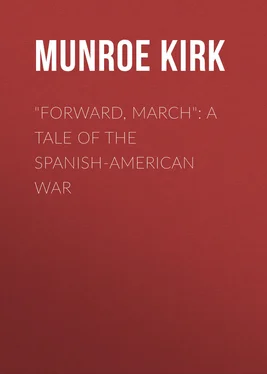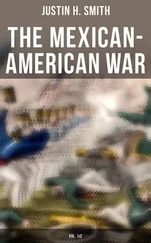Kirk Munroe - Forward, March - A Tale of the Spanish-American War
Здесь есть возможность читать онлайн «Kirk Munroe - Forward, March - A Tale of the Spanish-American War» — ознакомительный отрывок электронной книги совершенно бесплатно, а после прочтения отрывка купить полную версию. В некоторых случаях можно слушать аудио, скачать через торрент в формате fb2 и присутствует краткое содержание. Жанр: foreign_children, foreign_antique, foreign_prose, prose_military, на английском языке. Описание произведения, (предисловие) а так же отзывы посетителей доступны на портале библиотеки ЛибКат.
- Название:Forward, March: A Tale of the Spanish-American War
- Автор:
- Жанр:
- Год:неизвестен
- ISBN:нет данных
- Рейтинг книги:4 / 5. Голосов: 1
-
Избранное:Добавить в избранное
- Отзывы:
-
Ваша оценка:
- 80
- 1
- 2
- 3
- 4
- 5
Forward, March: A Tale of the Spanish-American War: краткое содержание, описание и аннотация
Предлагаем к чтению аннотацию, описание, краткое содержание или предисловие (зависит от того, что написал сам автор книги «Forward, March: A Tale of the Spanish-American War»). Если вы не нашли необходимую информацию о книге — напишите в комментариях, мы постараемся отыскать её.
Forward, March: A Tale of the Spanish-American War — читать онлайн ознакомительный отрывок
Ниже представлен текст книги, разбитый по страницам. Система сохранения места последней прочитанной страницы, позволяет с удобством читать онлайн бесплатно книгу «Forward, March: A Tale of the Spanish-American War», без необходимости каждый раз заново искать на чём Вы остановились. Поставьте закладку, и сможете в любой момент перейти на страницу, на которой закончили чтение.
Интервал:
Закладка:
Two dismounted squadrons of the Rough Riders were chosen to accompany the expedition, which, with the exception of themselves and two regiments of volunteer infantry, was composed of regulars; and, to the great joy of Ridge and his immediate friends, their troop was among those thus selected. But their joy was dimmed by being dismounted, and Ridge almost wept when obliged to part with his beloved mare.
However, as Rollo philosophically remarked, "Everything goes in time of war, or rather most everything does, and what can't go must be left behind."
So five hundred of the horseless riders were piled into a train of empty coal-cars, each man carrying on his person in blanket roll and haversack whatever baggage he was allowed to take, and they were rattled noisily away to Port Tampa, where, after much vexatious delay, they finally boarded the transport Yucatan , and felt that they were fairly off for Cuba.
But not yet. Again came a rumor of strange war-ships hovering off the coast, and with it a frightened but imperative order from Washington to wait. So they waited in the broiling heat, crowded almost to suffocation in narrow spaces–men delicately reared and used to every luxury, men who had never before breathed any but the pure air of mountain or boundless plain–and their only growl was at the delay that kept them from going to where conditions would be even worse. They ate their coarse food whenever and wherever they could get it, drank tepid water from tin cups that were equally available for soup or coffee, and laughed at their discomforts. "But why don't they let us go?" was the constant cry heard on all sides at all hours.
During this most tedious of all their waitings, only one thing of real interest happened. They had heard of the daring exploit of Naval Lieutenant Richmond Pearson Hobson, who, on the night of June 3d, had sunk the big coal-steamer Merrimac in the narrowest part of Santiago Harbor, in the hope of thus preventing the escape of Admiral Cervera's bottled fleet, and they had exulted over this latest example of dauntless American heroism, but none of the details had yet reached them.
On one of their waiting days a swift steam-yacht, now an armed government despatch-boat, dashed into Tampa Bay, and dropped anchor near the Yucatan . Rumor immediately had it that she was from the blockading fleet of Santiago, and every eye was turned upon her with interest. A small boat carried her commanding officer ashore, and while he was gone another brought one of her juniors, Ensign Dick Comly, to visit his only brother, who was a Rough Rider. The Speedy had just come from Santiago, and of course Ensign Comly knew all about Hobson. Would he tell the story of the Merrimac ? Certainly he would, and so a few minutes after his arrival the naval man was relating the thrilling tale as follows:
"I don't suppose many of you fellows ever heard of Hobson before this, but every one in the navy knew of him long ago. He is from Alabama, was the youngest man in the Naval Academy class of '89, graduated number 2, was sent abroad to study naval architecture, and, upon returning to this country, was given the rank of Assistant Naval Constructor. At the beginning of this war he was one of the instructors at Annapolis, but immediately applied for active duty, and was assigned to the New York .
"When Victor Blue, of the Suwanee , had proved beyond a doubt by going ashore and counting them that all of Cervera's ships were in Santiago Harbor, Hobson conceived the plan of keeping them there by taking in a ship and sinking it across the channel. Of course it was a perfectly useless thing to do, for Sampson's fleet is powerful enough to lick the stuffing out of the whole Spanish navy, if only it could get the chance. However, the notion took with the Admiral, and Hobson was told to go ahead.
"He selected the collier Merrimac , a big iron steamer 300 feet long, stripped her of all valuable movables, and fastened a lot of torpedoes to her bottom. Each one of these was sufficiently powerful to sink the ship, and all were connected by wires with a button on the bridge. Hobson's plan was to steam into the channel at full speed, regardless of mines or batteries, and anchor his ship across the narrowest part of the channel. There he proposed to blow her up and sink her. What was to become of himself and the half dozen men who were to go with him I don't know, and don't suppose he cared.
"At the same time there was some provision made for escape in case any of them survived the blowing up of their ship. They carried one small dingy along, and an old life-raft was left on board. A steam-launch from the New York was to follow them close in under the batteries, and lie there so long as there was a chance of picking any of them up, or until driven off. Cadets Palmer and Powell, each eager to go on this service, drew lots to see which should command the launch, and luck favored the latter.
"When it was known that six men were wanted to accompany Hobson to almost certain death, four thousand volunteered, and three thousand nine hundred and ninety-four were mightily disappointed when the other six were chosen."
"I should have felt just as they did if I had been left in camp," said Ridge, who was following this story with eager interest.
"Me too," replied Rollo Van Kyp, to whom the remark was addressed.
"The worst of it was," continued the Ensign, "that those fellows didn't get to go, after all, for when they had put in twenty-four hours of hard work on the Merrimac , with no sleep and but little to eat, only kept up by the keenest kind of excitement, it was decided to postpone the attempt until the following night. At the same time the Admiral, fearing the nerve of the men would be shaken by so long a strain, ordered them back to their ships, with thanks for their devotion to the service, and selected six others to take their places. The poor fellows were so broken up by this that some of them cried like babies."
"It was as bad as though we should be ordered to remain behind now," said Ridge.
"Yes," answered Rollo. "But that would be more than I could bear. I'd mutiny and refuse to go ashore. Wouldn't you?"
"I should certainly feel like it," laughed the former. "But orders are orders, and we have sworn to obey them, you know. At the same time there's no cause for worry. We are certain to go if any one does."
"Yes, me and Teddy–" began Rollo, but Ridge silenced him that they might hear the continuation of the Ensign's story.
"At three o'clock on Friday morning, the 3d," resumed Comly, "the Merrimac left the fleet and steamed in towards Santiago entrance. On board, besides Hobson and his six chosen men, was one other, a coxswain of the New York , who had helped prepare the collier for her fate, and at the last moment stowed himself away in her hold for the sake of sharing it.
"With Hobson on the bridge, two men at the wheel, two in the engine-room, two stoking, and one forward ready to cut away the anchor, the doomed ship entered the narrow water-way and passed the outer line of mines in safety. Then the Spaniards discovered her, and from the way they let loose they must have thought the whole American fleet was trying to force the passage. In an instant she was the focus for a perfect cyclone of shot and shell from every gun that could be brought to bear, on both sides of the channel.
"It was like rushing into the very jaws of hell, with mines exploding all about her, solid shot and bursting shells tearing at her vitals, and a cloud of Mauser bullets buzzing like hornets across her deck. How she lived to get where she was wanted is a mystery; but she did, and they sunk her just inside the Estrella battery. At the last they could not steer her, because her rudder was knocked away. So they anchored, waited as cool as cucumbers for the tide to swing her into position, opened all their sea-valves, touched off their torpedoes, and blew her up.
Читать дальшеИнтервал:
Закладка:
Похожие книги на «Forward, March: A Tale of the Spanish-American War»
Представляем Вашему вниманию похожие книги на «Forward, March: A Tale of the Spanish-American War» списком для выбора. Мы отобрали схожую по названию и смыслу литературу в надежде предоставить читателям больше вариантов отыскать новые, интересные, ещё непрочитанные произведения.
Обсуждение, отзывы о книге «Forward, March: A Tale of the Spanish-American War» и просто собственные мнения читателей. Оставьте ваши комментарии, напишите, что Вы думаете о произведении, его смысле или главных героях. Укажите что конкретно понравилось, а что нет, и почему Вы так считаете.












